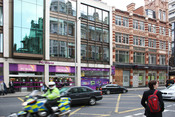CAW vs PC WORLD
Case
Straight out, this case is about the "duty to bargain in good faith", unfair labour practices.
CAW-Local 127, the applicant, claimed that PC World the responding party, that they engaged in bad faith bargaining, and requested a number of remedies for the alleged breach. PC World denied it had breached the Act, and was seeking the dismissal of these applications.
The Boards decision after hearing from both sides: a) is that the January 8, 1997 proposal made by PC World has been extinguished by the passage of time; b) that PC World did violate the obligation to bargain in good faith and to make every reasonable effort to reach a collective agreement; c) that PC World's proposal of April 18, 1997, appears to have been designed to be rejected by the Union and its members; d) the parties are directed to return to bargaining forthwith to bargain in good faith and to make every reasonable effort that reach a collective agreement.
PC World was stating that their January 8th proposal was removed off the table, where the Union stated that the offer was still valid and it was never removed. So PC World, due to a lengthy strike, the offer should be considered to have elapsed. In the Board's decisions after reviewing the evidence decided that PC World never told the Union on January 8th that if a strike commenced that the last offer was off the table. That if the offer had been withdrawn and they did not notify the Union, then the employer had failed to bargain in good faith because both sides never met again until April 16, 1997.
From the commencement of the strike the Union persistently asked and pleaded to meet with the employer to recommence bargaining.


